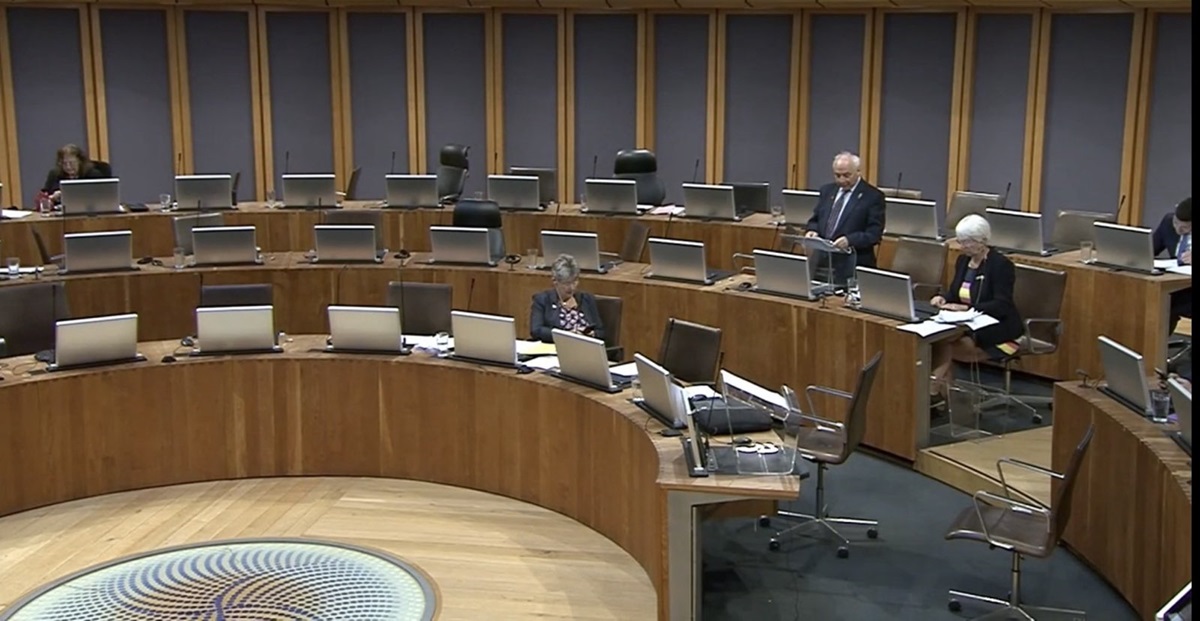September 19, 2024
Yesterday morning, Palestine Action co-founder Richard Barnard appeared at Westminster Magistrate’s Court for a plea hearing, after being charged for alleged offences pertaining to two speeches he made in October 2023. The speeches took place a month before a six-week trial in which eight Palestine Action supporters walked free over more than two dozen charges after the jury either failed to reach verdicts or acquitted them.
Barnard was found not guilty of encouraging criminal damage during that trial, but is now facing two new charges under the same offence (Section 44 of the Serious Crime Act 2007), along with a new charge of expressing an opinion or belief that was supportive of a proscribed organisation, namely Hamas, or being reckless as to whether it encouraged support of that organisation, contrary to Section 12(1A) of the Terrorism Act 2000.
The decision to charge him under Terrorism legislation came after 10 activists from Palestine Action were detained without charge for seven days under that same legislation, following their action which is claimed to have cost Israel’s biggest weapons producer, Elbit Systems, over £1million in damages. They were eventually charged under other more standard criminal legislation, leaving Barnard the first Palestine Actionist to face terrorism charges. There are currently 16 people in prison, some on remand, in a deepening clampdown on the campaign against Israeli arms company Elbit Systems.
Fellow co-founder Huda Ammori said that it was revealed in court the new Attorney General Richard Hermer had decided to proceed with the terrorism charge, despite his supposed pro-Palestinian signalling, and it reveals the new government is more determined to crack down on citizens who believe they are acting in line with international law, than to confront Israel and Elbit Systems, a company complicit and profiting directly from the war on Gaza.
Yesterday, Barnard’s barrister, Audrey Mogan, argued that he could not enter a plea because the Crown had not provided the full evidence they relied on, and also overturned their request for bail conditions preventing him from attending ANY protest or demonstration. He as given unconditional bail and ordered to appear at the Old Bailey on October 4th to enter a plea on the three charges against him.
Supporters rallied outside the court yesterday with various banners including a huge one calling to “Stop Arming Israel”.

Richard Barnard is being charged under the Terrorism Act

Palestine Action co-founder Richard Barnard
By Charlie Kimber
Wednesday 18 September 2024
Palestine Action (PA) co-founder Richard Barnard was brought before Westminster Magistrates’ Court on Wednesday as part of the state’s latest attempted crackdown on protest.
He faces three charges for two speeches. He is accused of inviting support for a proscribed organisation under Section 12(1A) of the Terrorism Act. The accusation is that he “expressed an opinion or belief that was supportive of a proscribed organisation, namely Hamas, being reckless as to whether it encouraged support of that organisation”.
Barnard is also said to have encouraged criminal activity under the Serious Crime Act. His charges relate to speeches during a Manchester protest on 8 October and in Bradford on 11 October.
The prosecutor said he had broken the Terrorism Act and also praised Palestine Action’s campaigns against Elbit, Israel’s largest arms firm. The magistrate sent Barnard to the Old Bailey on 4 October for the next stage of his case.
The prosecution confirmed that Labour’s attorney-general Richard Hermer, the government’s top legal adviser, consented to the terrorism charge. Hermer signed an open letter to the Financial Times newspaper last October over Israel’s possible violations of international law. Now he signs off those who oppose such Israeli action.
The prosecution sought bail conditions banning Barnard from taking part in protests or going within 100 metres of such a protest. But the magistrate did not impose any restrictions.
Outside the court, PA supporter Ayesha told Socialist Worker, “Richard is a hero for standing against genocide, and so are all those the state targets.”
Tom added, “Our action against Elbit is hitting home. That is why these prosecutions are happening.”
The state is not always winning in court. Last Friday a jury in Bradford, West Yorkshire, was divided and refused to convict four activists who cost Teledyne’s weapons factory over £500,000 in damages. They had disrupted the production of Israeli missile parts.
This result came despite the judge rejecting all legal defences, including the necessity to save lives and prevent a greater crime.
A retrial is expected in February 2026, giving another opportunity to expose who the real criminals are.
Recent arrests and trials have shown the state is hoping to intimidate Palestine solidarity. It is also stepping up sentences of Just Stop Oil activists and other environmental campaigners.

Cheers as jury fails to convict ‘Teledyne Four’ Palestine activists
We need to continue the mass movement for Palestine and back those who take direct action.
Outside Westminster magistrates’ court, PA co-founder Huda Ammori said, “It’s very clear that they are doing this because he is a co-founder of Palestine Action.
“It’s because we call for direct action against Israeli weapons factories. This is a vindictive trial.
“Rather than prosecute the war criminals, they’re going after those who speak out against them, who call for us to take direct action against them.
“One of the charges is Section 12, under the Terrorism Act, essentially for calling for direct action. The very vindictive charge is one that has been spurred on by a Zionist campaign.
“I also want to remind everyone that we have 16 political prisoners. Sixteen people from Palestine action are in prison for trying to stop a genocide.
“They are wielding counter-terrorism powers in a bid to protect Israel’s weapons trade. And they are doing it because they know Palestine Action is a threat to the companies who are arming genocide.
“But Palestine Action will not stop. We will not give in, we will not surrender. And Elbit’s days in this country are numbered.”
Stop prisoner isolation
Palestine activists William Plastow and Ian Sanders are both in Wormwood Scrubs prison awaiting trial.
They are accused of being connected to an action which cost Elbit over £1 million in damages. They have not been allowed to receive any outside letters or emails for nearly four weeks.
William and Ian, along with eight others, were detained in solitary confinement for a week. They were interrogated repeatedly by counter-terrorism police, before being remanded to prison.
The state has refused them the right to receive outside post while on remand and access to a working phone. By doing so, it’s manufacturing the isolation of Palestine Action’s political prisoners.
Contact the prison and demand that both William and Ian have access to their post and are placed together in the same cell with a working phone.You can ask to speak to the governor, Amy Frost, or any other member of staff to raise your concerns on 020 8588 3200 or 0208 588 3216 or email wormwoodscrubs@hmps.gsi.gov.uk





 National Education Union
National Education Union